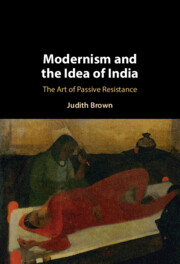Book contents
- Modernism and the Idea of India
- Modernism and the Idea of India
- Copyright page
- Dedication
- Contents
- Figures
- Acknowledgments
- Introduction
- Chapter 1 Tagore’s Emancipated Spectator
- Chapter 2 Questions for R. K. Narayan
- Chapter 3 Amrita Sher-Gil’s Passive Figures
- Chapter 4 Languishing in Ahmed Ali’s Delhi
- Chapter 5 Love and Castration in G. V. Desani
- Chapter 6 Virginia Woolf’s Passive Revolution
- Chapter 7 Le Corbusier’s Impassive Partition Monument
- Works Cited
- Index
Chapter 4 - Languishing in Ahmed Ali’s Delhi
Published online by Cambridge University Press: 02 January 2025
- Modernism and the Idea of India
- Modernism and the Idea of India
- Copyright page
- Dedication
- Contents
- Figures
- Acknowledgments
- Introduction
- Chapter 1 Tagore’s Emancipated Spectator
- Chapter 2 Questions for R. K. Narayan
- Chapter 3 Amrita Sher-Gil’s Passive Figures
- Chapter 4 Languishing in Ahmed Ali’s Delhi
- Chapter 5 Love and Castration in G. V. Desani
- Chapter 6 Virginia Woolf’s Passive Revolution
- Chapter 7 Le Corbusier’s Impassive Partition Monument
- Works Cited
- Index
Summary
Ahmed Ali, a founding member of the All-India Progressive Writers Association (PWA), was castigated for his first novel in English which failed, according to its critics, to address the pressing needs of India’s poor and suffering. Ali’s Twilight in Delhi is surprisingly committed to passivity, given the writer’s pioneering affiliation with the activist group. Instead of representing activist struggle, his novel depicts the death of a culture and its lingering afterlife, ironically via the English language and literary form. While there is no doubting the novel’s opposition to empire, it embraces passivity as a formal challenge to the ideological demands of the PWA, whose members openly derided it. Two fragile cultural forms linger even after their extinction in the novel: Urdu poetry, especially the ghazal form, and the ancient art of pigeon-keeping. In the end, the novel aligns itself with the vanquished and vulnerable – whether art or animal – and submits to an imperial form that will paradoxically ensure their survival.
Keywords
- Type
- Chapter
- Information
- Modernism and the Idea of IndiaThe Art of Passive Resistance, pp. 91 - 111Publisher: Cambridge University PressPrint publication year: 2025

